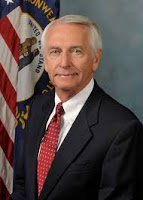Health care tops Gov. Steve Beshear’s accomplishments

 |
| Gov. Steve Beshear |
It took six years for Gov. Steve Beshear to establish his main legacy, but it came when he passionately embraced the Patient Protection and Affordable Care Act and expanded Medicaid on May 9, 2013, while vowing to improve the health of Kentuckians, Tom Loftus reports for The Courier-Journal.
Until then, it wasn’t clear what Beshear’s legacy would be. He became governor during the worst economic recession since the Great Depression, making it impossible to initiate any new, expensive programs and the “stubbornly conservative” Senate blocked his campaign priority to legalize casinos in the state, Loftus writes. “But in the sixth year of his administration, Beshear found a clear legacy that required no immediate state money and could be implemented by executive order.”
He embraced the heath-reform law, and expanded Medicaid to Kentuckians in households with incomes up to 138 percent of the federal poverty line.
That allowed more than 400,000 Kentuckians to gain insurance through Medicaid. Another 100,000 gained insurance through private, subsidized plans sold on the state’s Kynect insurance exchange. The percentage of Kentuckians without health insurance has dropped from 20.4 percent to 9 percent, the largest drop in the nation.
In addition, Beshear has said Medicaid expansion has brought nearly $3 billion in direct payments to health providers in the first 18 months of reform and thousands of health-related jobs. Medicaid data also show significant increases in preventive services for this population, more than doubling for dental services, breast cancer screenings and colon cancer screenings.
Beshear called his action “the single most important decision in our lifetime for improving the health of Kentuckians.”
“His legacy is definitely going to be access to health care. The result has been that over 500,000 have gotten coverage because he put the health of Kentuckians as his priority,” Emily Beauregard, executive director of Kentucky Voices for Health, told Loftus.
But many Republicans, like Senate Majority Leader Damon Thayer of Georgetown, say Kentucky can’t afford the expansion, and that the move has caused complications for providers and patients. Republican Gov.-elect Matt Bevin, who takes office Dec. 8, has said he will scale back the expansion.
“Access to health insurance does not always mean access to health care,” Thayer told Loftus. “Gov. Beshear has built a very intricate web of challenges for those of us who will be remaining in Frankfort to debate and implement policy.”
Hospitals and other health providers have generally been pleased with the expansion. Their issues have primarily been with Medicaid managed-care organizations, mainly subsidiaries of insurance companies, that get a flat fee per patient and make money on every expense they prevent.